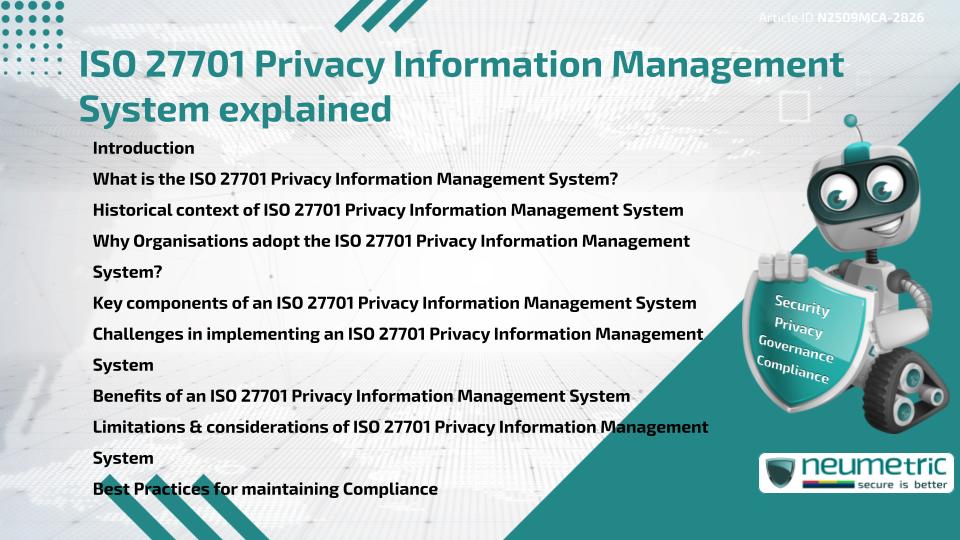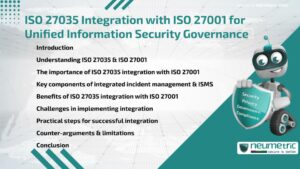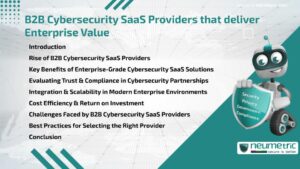Table of Contents
ToggleIntroduction
The ISO 27701 Privacy Information Management System [PIMS] is an extension of ISO 27001 & ISO 27002 that helps Organisations manage Personal Data responsibly. It provides a Framework to ensure Compliance with International Privacy Laws such as the General Data Protection Regulation [GDPR]. By adopting this system, Organisations can reduce regulatory Risks, demonstrate Accountability & strengthen Trust with Customers. This article explores what the Standard is, its history, components, benefits, challenges & best practices.
What is the ISO 27701 Privacy Information Management System?
The ISO 27701 Privacy Information Management System is a Standard designed to guide Organisations in building Privacy controls on top of their existing Information Security Management System [ISMS]. It outlines requirements for managing Personally Identifiable Information [PII] and ensures that roles & responsibilities are clearly defined between Data Controllers & Processors.
Historical context of ISO 27701 Privacy Information Management System
ISO 27701 was published in 2019 as a direct response to growing global concerns about Privacy. It built upon the foundations of ISO 27001 & ISO 27002, which had already established Trust in Information Security. As Privacy Regulations like GDPR began imposing stricter rules, Organisations needed a Framework that addressed Privacy alongside Security. ISO 27701 filled this gap by providing a structured approach to managing Personal Information in Compliance with evolving Legal requirements.
Why Organisations adopt the ISO 27701 Privacy Information Management System?
Organisations adopt the ISO 27701 Privacy Information Management System to:
- Demonstrate Compliance with Privacy Laws
- Build Trust with Customers, Regulators & Partners
- Reduce Risks of Fines, Penalties & Reputational damage
- Streamline Privacy practices across Departments
- Provide Evidence of Accountability during Audits
In today’s digital landscape, Customers & Regulators expect Organisations to protect data proactively rather than reactively.
Key components of an ISO 27701 Privacy Information Management System
The Standard introduces several key components:
- Privacy-specific roles: defining responsibilities for Data Controllers & Processors
- Data Lifecycle Management: from collection to deletion of Personal Data
- Policies & procedures: covering Consent, Access rights & Retention rules
- Risk Management: identifying, assessing & mitigating Privacy Risks
- Audits & Monitoring: ensuring ongoing Compliance with Policies & Regulations
- Training & Awareness: building staff understanding of Privacy responsibilities
Together, these components create a systematic approach to Privacy management.
Challenges in implementing an ISO 27701 Privacy Information Management System
Despite its clear benefits, Organisations often face difficulties:
- Limited Resources & Budgets for Privacy initiatives
- Lack of Internal Expertise in Privacy & Security Standards
- Cultural resistance to change within the Organisation
- Complexity of aligning Global Privacy Regulations with Internal Policies
- Technical difficulties in mapping & securing data flows
Overcoming these challenges requires Leadership support, adequate Training & Investment in Privacy Technologies.
Benefits of an ISO 27701 Privacy Information Management System
An ISO 27701 Privacy Information Management System provides multiple benefits, including:
- Enhanced credibility with Customers & Stakeholders
- Reduced Likelihood of Data Breaches & Penalties
- Easier Compliance with multiple Privacy Laws
- Improved alignment between Security & Privacy Programs
- Competitive advantage in Markets where Privacy is valued
This system turns Compliance into an enabler for Trust & long-term Business growth.
Limitations & considerations of ISO 27701 Privacy Information Management System
While useful, the ISO 27701 Privacy Information Management System is not a one-size-fits-all solution. It does not replace regional Privacy Lawss & must be customised to meet specific requirements. Certification can also be resource-intensive, making it more challenging for Small Organisations.
Additionally, the Standard provides a Framework rather than a prescriptive checklist, meaning Organisations must interpret requirements in the context of their operations.
Best Practices for maintaining Compliance
To sustain Compliance with the ISO 27701 Privacy Information Management System, Organisations should:
- Conduct regular Risk Assessments & Privacy impact analyses
- Keep Policies updated to reflect new legal requirements
- Provide ongoing Training & Awareness for Staff
- Monitor Vendors & Third Parties for Privacy Compliance
- Foster Leadership Accountability for Privacy initiatives
These practices ensure that Privacy Management remains effective & aligned with evolving expectations.
Conclusion
The ISO 27701 Privacy Information Management System equips Organisations with a robust Framework for safeguarding Personal Data. By adopting & maintaining this system, Businesses can build Trust, reduce regulatory Risks & embed Privacy into their core operations.
TakeLaways
- The ISO 27701 Privacy Information Management System extends ISO 27001 to Privacy management
- It helps Organisations comply with Global Privacy Laws such as GDPR
- Key components include Policies, Risk Management, Roles & Training
- Challenges include costs, expertise gaps & resistance to change
- Benefits include Trust, reduced Risk & Competitive advantage
- Best Practices involve Continual Monitoring, Updates & Leadership engagement
FAQ
What is the ISO 27701 Privacy Information Management System?
It is an International Standard that extends ISO 27001 to include Privacy Controls for managing Personal Data.
When was ISO 27701 introduced?
It was published in 2019 to help Organisations address Privacy concerns alongside Information Security.
Why should Organisations implement the ISO 27701 Privacy Information Management System?
It provides a structured approach to managing Personal Data & demonstrates Compliance with Global Privacy Laws.
Does ISO 27701 replace GDPR Compliance?
No, it does not replace GDPR or other Laws, but it helps Organisations align with & demonstrate Compliance.
What are the challenges of adopting ISO 27701?
Challenges include limited Resources, lack of Expertise, Cultural resistance & Technical complexity.
What benefits does the ISO 27701 Privacy Information Management System offer?
It enhances Trust, reduces Risks, improves Compliance & creates a Competitive advantage.
Is ISO 27701 Certification mandatory?
No, Certification is voluntary, but it strengthens Credibility & provides Evidence of Accountability.
How can Organisations maintain Compliance with ISO 27701?
They should conduct regular Audits, update Policies, train Staff & monitor Third Parties for Compliance.
Need help for Security, Privacy, Governance & VAPT?
Neumetric provides Organisations the necessary help to achieve their Cybersecurity, Compliance, Governance, Privacy, Certifications & Pentesting needs.
Organisations & Businesses, specifically those which provide SaaS & AI Solutions in the Fintech, BFSI & other regulated sectors, usually need a Cybersecurity Partner for meeting & maintaining the ongoing Security & Privacy needs & requirements of their Enterprise Clients & Privacy conscious Customers.
SOC 2, ISO 27001, ISO 42001, NIST, HIPAA, HECVAT, EU GDPR are some of the Frameworks that are served by Fusion – a SaaS, multimodular, multitenant, centralised, automated, Cybersecurity & Compliance Management system.
Neumetric also provides Expert Services for technical security which covers VAPT for Web Applications, APIs, iOS & Android Mobile Apps, Security Testing for LawS & other Cloud Environments & Cloud Infrastructure & other similar scopes.
Reach out to us by Email or filling out the Contact Form…





